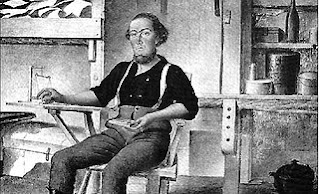The Real People: the Tonkawa
This people's name for themselves meant the Real People. However, they are often known by the neighboring Waco word, Tonkaweya, meaning They Stand All together. Members of the tribe live today in Texas and Oklahoma. The Tonkawa language is extinct today, with tribal members speaking English.
The Tonkawa most likely originated in northeastern Oklahoma, though by 1700, the Apache had put pressure on them to move to the Red River, which forms the boundary of what is now Texas and Oklahoma. The Tonkawas were soon in conflict with many local tribes, including Bidais, Caddos, Wichitas, Comanches and Yojuanes. There were accusations against the Tonkawa of cannibalism of enemies, a practice which many other Native people found especially threatening and repugnant. The tribe eventually migrated further into Texas and Mexico, allying with the Lipan Apache. In 1824, the Tonkawa entered into a treaty with Stephen F. Austin to provide protection of American settlers against the Comanche. The Tonkawa would fight in several battles including Plum Creek in 1840, and 1858 at Little Robe Creek alongside the Texas Rangers against the Comanche. The Tonkawa remained loyal to the Confederacy, which led to a bloody reprisal in 1862 known as the Tonkawa Massacre, decimating most of the tribe. The remaining Tonkawa settled in Kay County, Oklahoma.
Tonkawa scouts were attached to the 4th U.S. Cavalry in continuing battles with the Comanche, including 1871 Battle of Blanco Canyon and 1872 Battle of the North Fork of the Red River. In October, 1891, the tribe signed an agreement with the Cherokee Commission to accept allotted plots of land. Like many tribes, the Tonkawa were made up of several bands, some of which no longer exist today. The Tonkawa Tribe of Oklahoma is a federally recognized tribe.
The Tonkawa most likely originated in northeastern Oklahoma, though by 1700, the Apache had put pressure on them to move to the Red River, which forms the boundary of what is now Texas and Oklahoma. The Tonkawas were soon in conflict with many local tribes, including Bidais, Caddos, Wichitas, Comanches and Yojuanes. There were accusations against the Tonkawa of cannibalism of enemies, a practice which many other Native people found especially threatening and repugnant. The tribe eventually migrated further into Texas and Mexico, allying with the Lipan Apache. In 1824, the Tonkawa entered into a treaty with Stephen F. Austin to provide protection of American settlers against the Comanche. The Tonkawa would fight in several battles including Plum Creek in 1840, and 1858 at Little Robe Creek alongside the Texas Rangers against the Comanche. The Tonkawa remained loyal to the Confederacy, which led to a bloody reprisal in 1862 known as the Tonkawa Massacre, decimating most of the tribe. The remaining Tonkawa settled in Kay County, Oklahoma.
Tonkawa scouts were attached to the 4th U.S. Cavalry in continuing battles with the Comanche, including 1871 Battle of Blanco Canyon and 1872 Battle of the North Fork of the Red River. In October, 1891, the tribe signed an agreement with the Cherokee Commission to accept allotted plots of land. Like many tribes, the Tonkawa were made up of several bands, some of which no longer exist today. The Tonkawa Tribe of Oklahoma is a federally recognized tribe.




Comments
Post a Comment